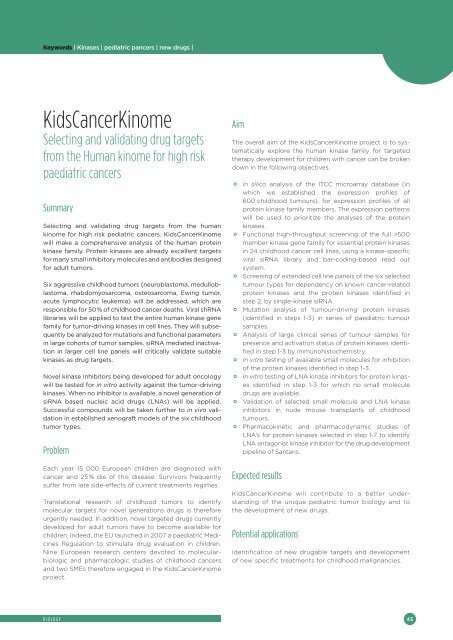Create successful ePaper yourself
Turn your PDF publications into a flip-book with our unique Google optimized e-Paper software.
Keywords | Kinases | pediatric pancers | new drugs |<br />
Kids<strong>Cancer</strong>Kinome<br />
Selecting and validating drug targets<br />
from the Human kinome for high risk<br />
paediatric cancers<br />
Summary<br />
Selecting and validating drug targets from the human<br />
kinome for high risk pediatric cancers. Kids<strong>Cancer</strong>Kinome<br />
will make a comprehensive analysis of the human protein<br />
kinase family. Protein kinases are already excellent targets<br />
for many small inhibitory molecules and antibodies designed<br />
for adult tumors.<br />
Six aggressive childhood tumors (neuroblastoma, medulloblastoma,<br />
rhabdomyosarcoma, osteosarcoma, Ewing tumor,<br />
acute lymphocytic leukemia) will be addressed, which are<br />
responsible for 50 % of childhood cancer deaths. Viral shRNA<br />
libraries will be applied to test the entire human kinase gene<br />
family for tumor-driving kinases in cell lines. They will subsequently<br />
be analyzed for mutations and functional parameters<br />
in large cohorts of tumor samples. siRNA mediated inactivation<br />
in larger cell line panels will critically validate suitable<br />
kinases as drug targets.<br />
Novel kinase inhibitors being developed for adult oncology<br />
will be tested for in vitro activity against the tumor-driving<br />
kinases. When no inhibitor is available, a novel generation of<br />
siRNA based nucleic acid drugs (LNAs) will be applied.<br />
Successful compounds will be taken further to in vivo validation<br />
in established xenograft models of the six childhood<br />
tumor types.<br />
Problem<br />
Each year 15 000 European children are diagnosed with<br />
cancer and 25 % die of this disease. Survivors frequently<br />
suff er from late side-eff ects of current treatments regimes.<br />
Translational research of childhood tumors to identify<br />
molecular targets for novel generations drugs is therefore<br />
urgently needed. In addition, novel targeted drugs currently<br />
developed for adult tumors have to become available for<br />
children. Indeed, the EU launched in 2007 a paediatric Medicines<br />
Regulation to stimulate drug evaluation in children.<br />
Nine European research centers devoted to molecularbiologic<br />
and pharmacologic studies of childhood cancers<br />
and two SMEs therefore engaged in the Kids<strong>Cancer</strong>Kinome<br />
project.<br />
BIOLOGY<br />
Aim<br />
The overall aim of the Kids<strong>Cancer</strong>Kinome project is to systematically<br />
explore the human kinase family for targeted<br />
therapy development for children with cancer can be broken<br />
down in the following objectives.<br />
• In silico analysis of the ITCC microarray database (in<br />
which we established the expression profi les of<br />
600 childhood tumours), for expression profi les of all<br />
protein kinase family members. The expression patterns<br />
will be used to prioritize the analyses of the protein<br />
kinases.<br />
• Functional high-throughput screening of the full >500<br />
member kinase gene family for essential protein kinases<br />
in 24 childhood cancer cell lines, using a kinase-specifi c<br />
viral siRNA library and bar-coding-based read out<br />
system.<br />
• Screening of extended cell line panels of the six selected<br />
tumour types for dependency on known cancer-related<br />
protein kinases and the protein kinases identifi ed in<br />
step 2, by single-kinase siRNA.<br />
• Mutation analysis of ‘tumour-driving’ protein kinases<br />
(identifi ed in steps 1-3) in series of paediatric tumour<br />
samples.<br />
• Analysis of large clinical series of tumour samples for<br />
presence and activation status of protein kinases identifi<br />
ed in step 1-3 by immunohistochemistry.<br />
• In vitro testing of available small molecules for inhibition<br />
of the protein kinases identifi ed in step 1-3.<br />
• In vitro testing of LNA kinase inhibitors for protein kinases<br />
identifi ed in step 1-3 for which no small molecule<br />
drugs are available.<br />
• Validation of selected small molecule and LNA kinase<br />
inhibitors in nude mouse transplants of childhood<br />
tumours.<br />
• Pharmacokinetic and pharmacodynamic studies of<br />
LNA’s for protein kinases selected in step 1-7 to identify<br />
LNA antagonist kinase inhibitor for the drug development<br />
pipeline of Santaris.<br />
Expected results<br />
Kids<strong>Cancer</strong>Kinome will contribute to a better understanding<br />
of the unique pediatric tumor biology and to<br />
the development of new drugs.<br />
Potential applications<br />
Identifi cation of new drugable targets and development<br />
of new specifi c treatments for childhood malignancies.<br />
45
















